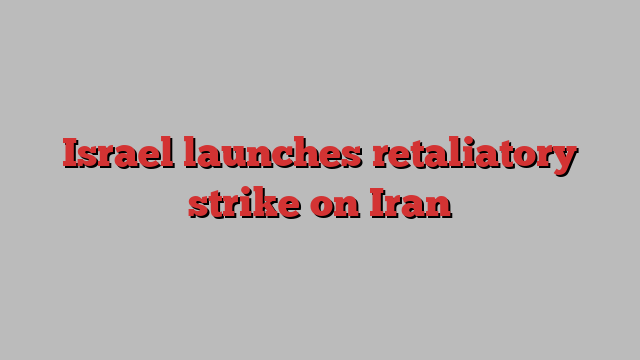
Unlock the Editor’s Digest for free
Roula Khalaf, Editor of the FT, selects her favourite stories in this weekly newsletter.
Israel said early Saturday it had begun retaliatory strikes on Iran, the latest salvo in an escalating conflict between the regional rivals as the US and its allies fear an all-out war.
Israel’s military offered few details about the strikes, other than describing them as “precise” and aimed at “military targets in Iran”.
“Our defensive and offensive capabilities are fully mobilised,” IDF spokesman Daniel Hagari said in a statement. “We will do whatever necessary to defend the State of Israel and the people of Israel.”
Iranian officials have yet to confirm the attacks. But explosions could be heard in Tehran and the city of Karaj to the west, with Iranians on social media describing multiple blasts that rattled the capital.
Saeed Chalanderi, CEO of Imam Khomeini Airport City Company, said the capital’s international airport was in a “stable situation” and that there were “no instructions to halt flights”.
The US had pressed Israel to avoid striking Iran’s nuclear sites or oil facilities after the Islamic republic fired about 180 ballistic missiles at the Jewish state three weeks ago.
US Secretary of State Antony Blinken this week met Israeli Prime Minister Benjamin Netanyahu and other senior Israeli officials and reiterated Washington’s calls for a measured response.
The Biden administration was notified of the strikes in advance but did not participate in the attack, a senior US administration official said.
US National Security Council spokesperson Sean Savett said: “We understand that Israel is conducting targeted strikes against military targets in Iran as an exercise of self-defence and in response to Iran’s ballistic missile attack against Israel on October 1st. ”
Iran launched its ballistic missile barrage against Israel in what it said was a response to the Israeli assassination of Hassan Nasrallah, the leader of Lebanese militant group Hizbollah, in an air strike on Beirut.
The attack was considered far more severe than a previous Iranian assault on Israel in April that involved hundreds of missiles and drones but was clearly telegraphed. That was the first direct attack on Israel from Iranian soil but did limited damage, and Israel responded with a missile strike on a military base near the Iranian city of Isfahan.
That tit-for-tat exchange was contained. But this month’s Iranian barrage happened with little notice and was aimed at multiple targets including an intelligence base just north of Tel Aviv, Israel’s commercial hub, with Israel expected to launch a more robust response than in April.
The US earlier this month sent an advanced antimissile system, the Terminal High-Altitude Area Defense (Thaad) battery, to bolster Israel’s air defences ahead of its planned response.
On Thursday US Central Command said multiple F-16 fighter aircraft had arrived in the region, part of US efforts to support Israel should Iran decide to respond.